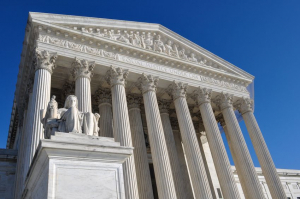Benefits Buzz
The Affordable Care Act is Headed Back to the Supreme Court

On March 2, 2020, the Supreme Court of the United States (SCOTUS) announced that it would once again hear a case on the Affordable Care Act (ACA) and whether the law is constitutional.
The underlying issue at hand pertains to the Individual Shared Responsibility requirement, which most people refer to as the Individual Mandate. The ACA includes a federal requirement that most Americans must have health insurance or pay a penalty; however, the penalty has been reduced to $0 while the mandate to have health insurance remains intact.
In 2012, Republican leaders challenged the constitutionality of the ACA. They argued that Congress exceeded their power under the Commerce Clause. The Commerce Clause gives Congress the ability to regulate the buying and selling of goods and services. Republicans argued that the Commerce Clause does not give Congress the right to force people to engage in commerce (i.e. they argued Congress couldn’t force people to buy insurance). They used the analogy of Congress having the ability to force everyone to buy broccoli.
In the end, the SCOTUS ruled 5-4 that the ACA was constitutional in large part because there was a penalty for those individuals who did not have health insurance. The penalty was considered a tax, and Congress does have the power to tax. The ACA survived as a result.
The penalty for not having insurance was reduced to $0 in 2019, and a challenge to the constitutionality of the ACA is once again underway. In December of 2018, a Texas District Court sided with Republicans and ruled that the ACA was now unconstitutional. That ruling was appealed to a federal court in New Orleans.
In December of 2019, a panel of judges hearing the appeal agreed that the Individual Mandate was now unconstitutional, but they questioned whether the entire ACA was unconstitutional. They sent the case back to the lower court asking it to review whether the Individual Mandate and only those provisions most closely related to it were severable from the rest of the law. In other words, they questioned whether some parts of the law could remain in place if other parts were eliminated.
Democratic leaders have since asked the highest court in the land, the SCOTUS, to step in and issue a ruling on the ACA. They were hoping for a fast-tracked case, but the SCOTUS declined to escalate any hearings. Under its ordinary practices, the SCOTUS will take up this case around October of 2020 with a ruling expected to come in the Spring or Summer of 2021. The fate of the ACA is once again in the hands of the SCOTUS.
Have a question about the Affordable Care Act?

